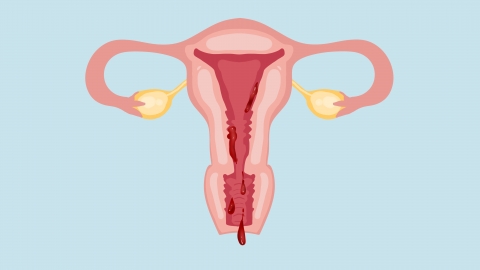What causes abnormal uterine bleeding?
Generally, abnormal uterine bleeding may be caused by endocrine instability during puberty, hormonal fluctuations during the perimenopausal period, endometrial polyps, adenomyosis, uterine fibroids, and other factors. If experiencing discomfort, it is recommended to seek medical attention promptly. Detailed explanations are as follows:
1. Endocrine Instability During Puberty
During puberty, the hypothalamic-pituitary-ovarian axis in girls is not yet fully mature, and hormonal secretion regulation is incomplete, making it prone to ovulation disorders. This can lead to irregular shedding of the endometrium and cause abnormal uterine bleeding. In daily life, maintaining a regular sleep schedule, avoiding staying up late, and ensuring sufficient sleep are important. Pay attention to a balanced diet, increasing intake of protein- and vitamin-rich foods such as eggs, vegetables, and fruits. Additionally, maintain a relaxed mood and avoid excessive tension or anxiety. With age, the endocrine system gradually improves, and symptoms may resolve spontaneously.
2. Hormonal Fluctuations During the Perimenopausal Period
In the perimenopausal period, women experience gradual ovarian decline, with fluctuating estrogen secretion and reduced or absent ovulation. The endometrium is stimulated by unopposed estrogen, making it prone to breakthrough bleeding or withdrawal bleeding. Regular gynecological examinations should be conducted to monitor endometrial thickness and other factors. Maintain good lifestyle habits and engage in mild exercises like walking or tai chi to enhance physical fitness. If bleeding symptoms are significant, promptly inform the physician and follow medical guidance for appropriate management.

Endometrial polyps result from excessive localized growth of the endometrium and can cause abnormal uterine bleeding symptoms such as intermenstrual bleeding, menorrhagia, and prolonged menstruation. Small, asymptomatic polyps can be monitored regularly. If polyps cause significant bleeding, medication such as dydrogesterone tablets, progesterone capsules, or medroxyprogesterone acetate tablets may be used under medical guidance to inhibit polyp growth. In severe cases, hysteroscopic polypectomy should be performed under medical guidance, with regular follow-up examinations.
4. Adenomyosis
Adenomyosis occurs when endometrial glands and stroma invade the uterine muscle layer, leading to uterine enlargement, increased menstrual flow, prolonged menstruation, and other abnormal bleeding manifestations. Symptom relief can be achieved under medical guidance using medications such as danazol capsules, gestrinone capsules, or levonorgestrel-releasing intrauterine systems. Adequate rest is essential, avoiding excessive fatigue and strenuous exercise. If medication proves ineffective and bleeding is severe, surgical treatment should be considered under medical guidance.
5. Uterine Fibroids
Uterine fibroids are common benign tumors of the female reproductive system. Submucosal fibroids and intramural fibroids protruding toward the mucosal layer can affect uterine contractions, leading to increased menstrual flow and prolonged menstruation, manifesting as abnormal uterine bleeding. For mild symptoms, medication such as mifepristone tablets, Guizhi Fuling capsules, or Gongliuxiao capsules may be used under medical guidance. Regular gynecological ultrasound examinations should be conducted to monitor changes in fibroid size. If fibroids are large or bleeding is severe, surgical treatments such as myomectomy should be considered under medical guidance.
In daily life, maintaining personal hygiene and keeping the external genital area clean to prevent infection is important. Avoid consuming excessive spicy or cold irritating foods.









